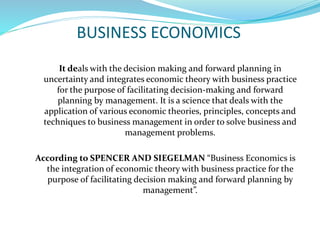The Future of global evolution of Business and Economics will shape global economies
The Future of global evolution of Business and Economics will shape global economies
Blog Article
Understanding Financial Principles for Better Business Decision-Making
In the facility landscape of modern service, a thorough understanding of financial principles can dramatically enhance decision-making processes. The application of these financial concepts frequently exposes unanticipated difficulties and possibilities that can redefine strategic techniques.
The Essentials of Economic Theory
Economic theory functions as the structure for understanding how individuals and companies make choices in the existence of shortage. At its core, financial concept checks out the allocation of limited resources to please endless desires. This basic concept of deficiency requires trade-offs, compelling decision-makers to evaluate the benefits and costs related to numerous choices.
The two main branches of economic concept are microeconomics and macroeconomics. Microeconomics concentrates on specific representatives, such as customers and companies, examining their actions and communications in details markets. It stresses principles like supply and demand, cost flexibility, and market equilibrium, which are vital for comprehending exactly how costs are identified and how resources are distributed.
On the other hand, macroeconomics analyzes the economic climate overall, attending to wider issues such as inflation, joblessness, and economic development. It supplies insights into systemic sensations that affect all financial agents, guiding policymakers in crafting efficient financial methods.
Inevitably, a solid grounding in financial concept is vital for effective business decision-making. By recognizing the principles of shortage, trade-offs, and market characteristics, organizations can much better navigate complicated atmospheres and make informed options that enhance their affordable advantage.
Key Economic Indicators
Secret economic signs function as necessary tools for evaluating the wellness and instructions of an economy, supplying valuable understandings for company decision-making. These indications are quantitative actions that reflect the financial performance and can be categorized right into leading, lagging, and coincident signs.
Leading indicators, such as consumer self-confidence indexes and securities market trends, anticipate future financial activity, permitting companies to prepare for changes in the marketplace. Delaying signs, like joblessness prices and business earnings, give understandings right into the economy's past performance, assisting companies to review long-lasting trends. Coincident signs, such as GDP growth and retail sales, rise and fall simultaneously with the economy, using a real-time snapshot of economic problems.
Understanding these indications allows businesses to make informed decisions relating to financial investments, source appropriation, and tactical planning. For example, a surge in customer self-confidence might prompt companies to increase production in expectancy of greater need. On the other hand, increasing unemployment rates may bring about a reevaluation of development plans. By closely monitoring these key economic indicators, businesses can navigate unpredictabilities and position themselves efficiently in the ever-changing economic landscape, eventually improving their decision-making procedures and long-lasting success.

Market Frameworks and Characteristics
Comprehending market structures and characteristics is important for businesses intending to prosper read what he said in affordable environments. Market frameworks, generally categorized into best competitors, monopolistic competition, oligopoly, and monopoly, significantly influence prices strategies, item differentiation, and affordable habits. Each structure provides unique challenges and opportunities that can dictate a firm's calculated instructions.
Oligopolies, characterized by a few dominant players, lead to synergistic decision-making; firms must very carefully think about rivals' responses to their activities. Monopolies exist when a single firm manages the market, resulting in optimal pricing power yet typically drawing in governing analysis.
Recognizing these characteristics enables organizations to expect market trends, adapt approaches, and optimize resource appropriation. Furthermore, identifying exactly how exterior variables like innovation and law influence these frameworks can boost critical preparation. By understanding market structures and dynamics, companies can make educated choices, ultimately enhancing their affordable setting and driving lasting growth.
Customer Habits Insights
Consumer actions plays an essential function in more tips here forming organization strategies and end results. Understanding exactly how consumers make buying choices, their choices, and the factors influencing their behavior can dramatically boost a company's ability to meet market demands. Key insights into customer actions can be originated from evaluating demographics, psychographics, and behavior patterns.
Demographic variables such as age, gender, education and learning, and earnings level supply a foundational understanding of target audience. Psychographics delve much deeper, exploring consumers' values, perspectives, and lifestyles, which can influence brand loyalty and item perception. Behavior understandings, such as buying frequency and feedback to promotions, are very useful for tailoring marketing efforts.
Furthermore, outside factors like financial conditions, cultural patterns, and technological innovations also affect customer choices. For example, during financial downturns, consumers may prioritize necessary products over luxury things, modifying need patterns.
Using Economics to Technique
Insights gained from consumer habits contribute in creating efficient company methods. By leveraging financial principles, organizations can much better recognize market characteristics, optimize resource appropriation, and boost competitive placing. Analyzing demand elasticity, as an example, allows firms to change rates strategies to find out here make best use of income while staying eye-catching to customers.
Additionally, comprehending market segmentation permits organizations to customize their offerings, ensuring they meet the specific needs and choices of diverse consumer groups. Business and Economics. This targeted method enhances customer complete satisfaction and promotes brand name loyalty

Incorporating game concept into critical preparation also gives insights into competitive habits, permitting firms to prepare for rival activities and create counter-strategies effectively.

Conclusion
In final thought, a thorough understanding of financial concepts significantly enhances business decision-making. By checking out market structures, examining consumer actions, and analyzing key financial indications, firms can establish effective approaches that line up with market demands.
In the complex landscape of modern organization, a comprehensive understanding of economic principles can dramatically boost decision-making processes.Leading indicators, such as customer self-confidence indexes and supply market patterns, anticipate future financial task, enabling companies to anticipate changes in the market. By very closely keeping an eye on these key financial indications, companies can browse uncertainties and position themselves effectively in the ever-changing financial landscape, ultimately enhancing their decision-making procedures and lasting success.
By leveraging economic concepts, organizations can better understand market characteristics, maximize resource allocation, and improve affordable placing.In conclusion, a detailed understanding of financial concepts considerably improves company decision-making.
Report this page